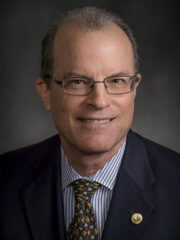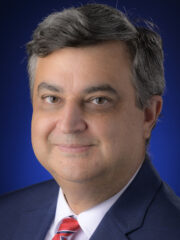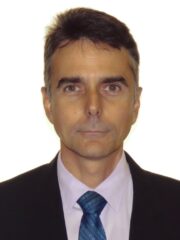Tuesday, 23 April 2024
Opening Keynote, “Future Connectivity for Aviation”

Dr. Todd Citron, Chief Technology Officer, The Boeing Company
Dr. Todd Citron is the chief technology officer of The Boeing Company, responsible for developing and executing Boeing’s technology strategy. This includes Boeing research & technology (BR&T), subsidiary Aurora Flight Sciences, and AvionX that are helping create the future by developing and transitioning critical technologies, delivering ground-breaking products, and providing daily program execution support across Boeing. It also includes the engineering oversight and support to the joint ventures at Wisk and SkyGrid. These global teams work in five U.S. and seven international research centers.
Prior to his current role, Citron was vice president of engineering for Boeing defense, space & security, where he was responsible for ensuring world-class technical integrity for all defense, space & security products and services. he led a 20,000-person international engineering organization that included teams across each division of the business.
Citron was previously vice president and chief engineer for defense, space & security development. there he managed engineering support for key focus programs in the business’s portfolio, improving execution through early deployment of critical resources and proven processes from across the company. His responsibilities also included creating and implementing a strategy to enhance engineering quality and affordability.
Previously, Citron was vice president of mission assurance and the senior chief engineer of systems engineering for defense, space & security engineering. In this role, he was responsible for the broad application of systems engineering and risk-reduction principles focused on issue prevention, risk reduction and mission success. He was also responsible for development and deployment of mission success strategy, policy and practices and served as independent approval authority for mission readiness of defense, space & security businesses, and programs. As senior chief engineer for systems engineering, he focused on technical risks, issues, and opportunities, strengthening technical decisions that achieve the “right engineering” the first time.
Sponsors and Exhibitors Reception
Evening Keynote, “NASA Vision for Future Aviation Operations and Safety Transformation”

Akbar Sultan, Director, Airspace Operations and Safety Program (AOSP), NASA
Mr. Sultan will provide a short career introduction into leadership journey at NASA for the future aviation leaders. This will be followed by the NASA mid-century vision on transformation of aviation operations and safety, from NextGen towards the ambitious mid-century Sky for All vision, a potentially revolutionary approach for safe and efficient air traffic management of future vehicles. NASA Sky for All vision will further the transition to a digital service-oriented architecture that is prognostic, collaborative, scalable, and dynamically adaptive for all future users.
Akbar Sultan is director of NASA’s Airspace Operations and Safety Program (AOSP), responsible for NASA’s aviation operations and safety research portfolio of more than $120 million across four research centers. The Airspace Operations and Safety Program (AOSP) works with the Federal Aviation Administration (FAA) and industry and academic partners to conceive and develop Next Generation (NextGen) air transportation system technologies to further improve the safety of current and future aircraft moving through the National Airspace System.
NextGen activity includes research to enable service-oriented architecture and integrated demand management operational efficiencies in the surface, terminal, en route, and oceanic operational domains for traditional aircraft, unmanned aircraft systems (UAS), and future autonomous systems. The program is also responsible for aviation safety research in the areas of aircraft state awareness, prevention of aircraft loss of control, verification and validation of complex systems, prognostic safety through data mining, and real-time system-wide safety assurance. A key focus is on developing and demonstrating enhanced systems that will enable routine access to the airspace by emergent users of UAS, especially in support of evolving urban air mobility concepts.
Sultan is the NASA co-lead on the NASA/FAA Research Transition Teams, which are organized to enable efficient and effective transition of NASA research into FAA implementation roadmaps. He is also the NASA liaison to the multiagency NextGen Interagency Planning Office and leads the program’s international collaboration activities. Sultan has 20 years of professional experience in aerospace and air traffic management research and development.
Previously, Sultan was a NASA liaison to the Joint Planning and Development Office in the ongoing development of NextGen, where he led the development of NextGen operational improvements. He also served as the Software Configuration, Release, and Verification and Validation Manager for the Terminal Radar Approach Control automation system at NASA’s Ames Research Center in California. There he was responsible for gaining FAA certification for NASA prototype systems in operational field trials.
Sultan received two Bachelor of Science degrees – in mechanical engineering and in aeronautical science and engineering – from the University of California Davis, and a Master of Science in aerospace engineering from San José State University.
Wednesday, 24 April 2024
Morning Keynote

Pascal Luciani, Deputy Director ANB, ICAO
Pascal Luciani is an engineer with 25 years of experience in transport in the civil administration of France and international organizations, 15 years of which in civil aviation.
Prior to joining the International Civil Aviation Organization (ICAO) as deputy director for air navigation and aviation safety, he served as deputy director for the French Safety Oversight Authority from 2018 to 2022. From 2014 to 2018 Pascal was the aviation counselor at the Permanent Representation for France with the European Union, covering all fields of aviation and was also responsible for shipping. In 2008 he was tasked with creating the Sustainable Aviation Department, DGAC, France, which he headed from 2008 to 2013.
Pascal’s experience in public service before joining the aviation sector includes road infrastructure and road safety (1997 – 2001) and port infrastructure and development (2001- 2005). He also served for two years as technical advisor for the Ministers of Environment and Transport (2005 – 2007). Pascal also headed the modernization mission in charge of supervising the merging of the Ministries of Transport and Environment in France (2007-2008).
